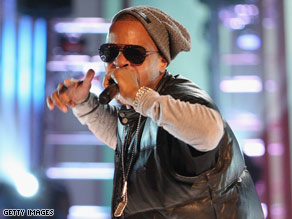
World-famous rapper T.I. will appear in a federal courtroom Friday for sentencing on weapons charges related to purchasing machine guns and silencers.
T.I., whose real name is Clifford Harris, is expected to be sentenced to one year in prison and be ordered to pay a $100,000 fine, under the terms of a plea agreement reached with authorities last year. The agreement allowed Harris to remain out of prison for a year while he performed 1,000 hours of community service. In that time, Harris has completed his hours by mentoring at-risk students at 58 schools, 12 Boys & Girls Clubs, nine churches and many other nonprofit organizations, according to court documents. Meanwhile, the rapper has released his sixth CD, “Paper Trail,” which has sold close to 2 million copies, according to Nielsen SoundScan. Harris recently talked to CNN about learning from his mistakes. “You shouldn’t take the things that I’ve gone through and the negative parts of my life and admire me for that,” Harris said. “If anything, admire me for how I’ve accepted responsibility for the part I’ve played in placing myself in these situations and what I’ve done to recover from it.” Harris starred in the film “ATL” and could be seen in Chevy commercials with NASCAR driver Dale Earnhardt Jr. Harris was named to the Forbes list of top-earning rappers in 2006, banking an estimated $16 million. Later, Harris’ fall from grace was sudden and dramatic. He was arrested in October 2007 in an Atlanta parking lot hours before he was to perform at the BET Hip Hop Awards. Harris was caught in a federal sting after his bodyguard-turned-informant delivered three machine guns and two silencers to him, prosecutors said. Harris had provided the bodyguard with $12,000 to buy the weapons. Harris was not permitted to own any guns, however, because he was convicted in 1998 on felony drug charges, including possession of crack cocaine with intent to distribute in Cobb County in suburban Atlanta. For his court hearing Friday, Harris’ attorneys have submitted more than 100 letters from officials who have thanked him for his community service since the weapons arrest. One of the letters was from Georgia Supreme Court Chief Justice Leah Ward Sears, who said Harris did an “outstanding job” talking to a group of teenagers about not breaking the law. “If only one young person in that courtroom listened to Mr. Harris, and I believe they all did, we are all better for it,” Sears wrote. “He was honest, humble and inspirational.”